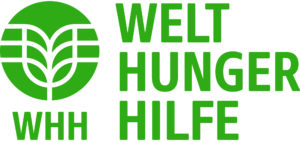Zero hunger in agricultural production: Not yet a reality, but achievable! Working together for human rights in supply chains
Deutsche Welthungerhilfe e.V.
Meo Carbon Solutions
Law firm GvW Graf von Westphalen
Aktivierung erforderlich
Wir möchten Sie darauf hinweisen, dass nach der Aktivierung Ihre Daten an Youtube übermittelt werden.
Summary of topics and results
The discussion session entitled “Zero hunger in agricultural production: Not yet a reality, but achievable! Working together for human rights in supply chains” brought together experts from various fields to discuss the challenges and opportunities in the realization of human rights in global supply chains on production level. The focus was on the human right to adequate food, whose violation frequently entails further human rights violations such as child labor due to its cross-cutting nature. Organized by Welthungerhilfe e. V. and Meo Carbon Solutions in cooperation with the law firm GvW Graf von Westphalen, the expert panel aimed to practically demonstrate the implementation possibilities of human rights due diligence obligations for companies using the Food Security Standard (FSS) and address the existing challenges.
In many countries of the Global South, that are producing agricultural commodities for the global market, hunger and malnutrition are still prevalent. Smallholder farmers and farm workers who produce flowers, tea, coffee, palm oil, and rubber are often affected by hunger and other human rights infringements. The FSS provides a toolbox to assist companies involved in such agricultural production chains to meet their social responsibility to by identifying, addressing and reporting human rights risks at cultivation level in accordance with current legislation.
Dr. Rafaël Schneider, Deputy Head of the Policy Department at Welthungerhilfe, opened the event with an introduction to previous examples showcasing the application of the Food Security Standard and stressed the importance of the human right to food in agricultural production. Dr. Lothar Harings, a lawyer at GvW Graf von Westphalen, delivered a keynote speech on current legislative processes and the central role of practical tools such as the FSS in complying with human rights due diligence obligations. He stressed the fundamental nature of food security in human rights and its close connection to the right to life and health, pollution prevention, protection against forced evictions, and the prohibition of wage discrimination.
The lively discussion amongst the panelists offered concrete insights and practical experience of the FSS implementation. Lutz Hartmann shared his experience with the challenges in African agricultural production, especially on his 300-hectare fruit and vegetable farm in Ethiopia and talked about his work with VegBox Horticulture. He emphasized that the implementation of human rights due diligence is not simply a matter of compliance but rather a matter of establishing concrete ways of how to think and work in production, which also involves the restructuring of management processes. Alejandra Rueda Zarate, founder of NES Naturaleza Colombia offered insights into her work, for example on social sustainability through realizing sustainability standards in the agricultural supply chain in Colombia. Dr. Bettina Rudloff from the “Stiftung Wirtschaft & Politik” contributed scientific perspectives by highlighting the importance of the right to food and due diligence obligations in the agricultural and food sectors, referencing the report submitted by the WBAE to the BMEL on “New Due Diligence Obligations for Companies in the Agricultural and Food Sectors: Recommendations on Current Legislative Developments.” Dr. Jan Henke from Meo Carbon Solutions demonstrated that social standards represent an opportunity for downstream companies to make credible claims when equal standards are demanded from all producers, enabling evidence-based customer communication. While scaling up presents a long road ahead, it is a crucial step in the right direction.
In her closing address, Swantje Nilsson, Director-General for International Cooperation at the BMEL, stressed the importance of working together to overcome global hunger and to develop practical solutions. She also emphasized the coordinating role of the Committee on World Food Security (CFS), which develops policy recommendations and guidelines on a wide spectrum of topics related to food security and supports their implementation.
The panel discussion illustrated that ambitious goals like “Zero Hunger” begin with small and concrete applications, and taking the first step is essential. Collaboration in the supply chain, which fosters transparency and develops shared solutions, is a crucial element for the food security of smallholder farmers and workers in producing countries, sustainable production, and socially sustainable supply chains. It became evident that addressing human rights in supply chains requires a collective effort from policymakers, scientists, the private sector, and civil society to effect sustainable change.
Speakers

Lothar Harings
Keynote-SpeakerLawyer / GvW Graf von Westphalen Show CV / Vita
CV / Vita
Dr Lothar Harings is a lawyer and partner at the GvW Graf von Westphalen law firm in Hamburg; he heads the firm’s Green Trade Team- Dr Harings is chairman of the European Forum for Foreign Trade, Customs and Excise (EFA) and a member of the advisory board of the Centre for Foreign Trade Law (ZAR). The focus of his legal practice is on advice in compliance issues and representation of companies with respect to due diligence obligations in the supply chain, in particular the German Act on Corporate Due Diligence in Supply Chains (LkSG), the EU Corporate Sustainability Due Diligence Directive (CSDDD) and the EU Regulation on Deforestation-free Products (EUDR). Dr Harings is a member of the editorial board of the magazine “Außenwirtschaftliche Praxis” (foreign trade practice – AW-Prax) with responsibility for the areas of sustainability and compliance.
Close CV / Vita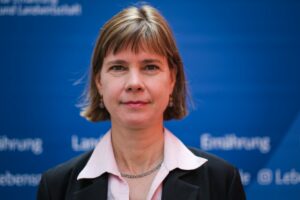
Swantje Nilsson
Keynote-SpeakerHead of Directorate-General for International Cooperation, Global Food Security and Fisheries / Federal Ministry of Food and Agriculture (BMEL) Show CV / Vita
CV / Vita
Ms Nilsson has worked in various specialist and international fields over more than twenty years at the Federal Ministry of Food and Agriculture (BMEL). She began her career as a desk officer – and later the head – of the Division for Speeches and Public Opinion Research, later renamed as the Division for Strategic Communication. She was subsequently appointed Head of the Division for International Food and Agriculture Organisations, Global Food Security and Sustainable Development in 2005. She then headed the Division for Food, Agriculture and Consumer Protection at the Permanent Representation of the Federal Republic of Germany to the FAO in Rome for four years. Upon her return to the BMEL, she headed the Division for Biomass Use for the Production of Materials and the Division for Sustainability, Climate Stewardship and Climate Change Impact. Since February 2022, Ms Nilsson has been Head of the Directorate-General for International Cooperation, Global Food Security and Fisheries at the BMEL.
Close CV / Vita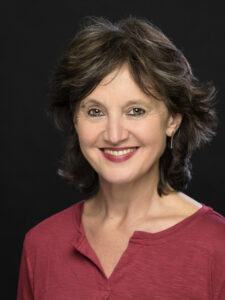
Heike Leitschuh
FacilitatorAuthor, facilitator and consultant for sustainable development Show CV / Vita
CV / Vita
Ms Heike Leitschuh (born 1958) is an author of books and facilitator for sustainable development as well as mediator and musician. Her activities focus on the socio-cultural aspects of transformation, sustainable corporate development and sustainable lifestyles. (www.heike-leitschuh.de.)
Close CV / Vita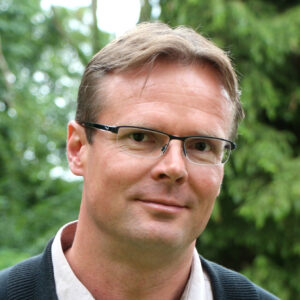
Rafaël Schneider
PanellistDeputy Head of Policy & External Relations / Welthungerhilfe Show CV / Vita
CV / Vita
Rafaël Schneider (Dr. rer. nat.) is geographer and works for the Deutsche Welthungerhilfe e.V., a private organisation acting in the area of development cooperation and humanitarian aid. As deputy head of the policy division he addresses development policies related to global food security, rural development, agriculture and value chains, nutrition and the Human Right to Food. He also manages the strategic development of the Food Security Standard (FSS). Before, he has been coordinator at the German Development Service (DED) in N’Djaména (Chad) and senior advisor in a DED-GTZ-Program on rural development in Natitingou (Benin).
Close CV / Vita
Lutz Hartmann
PanellistFounder and Managing Director / FruitBox Africa Show CV / Vita
CV / Vita
Mr Lutz Hartmann studied in Mainz, Freiburg and Paris and is a qualified lawyer in Germany and France. He specialises in cross-border M&A transactions with foreign businesses in Germany and German businesses in France and Africa. In 2016, he founded the FruitBoxAfrica business, which is establishing a 300 ha fresh fruit and vegetable farm in Ethiopia He was a board member of the German-African Business Association.
Close CV / Vita
Jan M. Henke
PanellistGeschäftsführer / ISCC und Meo Carbon Solutions Show CV / Vita
CV / Vita
Jan Henke studied International Economics at the University of Tübingen in Germany. He had worked for four years at the Kiel Institute for the World Economy in the research area of environmental and resource economics. During that time, he also acquired his PhD. He then joined Meo Carbon Solutions, a management consultancy focusing on sustainability, climate change, carbon markets, renewable resources, bio- and circular economy and sustainability certification.
Jan has also been involved from the beginning in the development of ISCC (International Sustainability and Carbon Certification) and GRAS (Global Risk Assessment Services) in multi-stakeholder processes and is a board member of the coffee certification system 4C.
Jan works globally on topics of renewable resources, sustainability, renewable energies, climate change, carbon markets, land use and land use change, GHG calculations, the circular economy and bioeconomy and sustainability certification for all markets. Currently he is inter alia responsible for the further development of ISCC PLUS for the circular economy and bioeconomy.
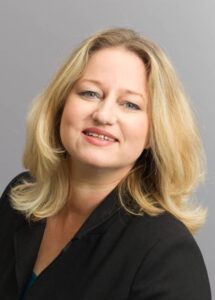
Bettina Rudloff
PanellistSenior Associate / German Institute for International and Security Affairs (SWP) Show CV / Vita
CV / Vita
Bettina Rudloff holds a PhD in Agricultural Economics from the University of Bonn, where she was also Assistant Professor at the Institute for Food and Resource Economics. At the European Institute of Public Administration (EIPA), Maastricht, she led training programmes for the EU Commission for WTO trade negotiators from developing countries.
She is currently conducting research at the German Institute for International and Security Affairs in Berlin (SWP) at the interface of trade, agricultural policy and foreign policy, for example on geo-strategic aspects of food security and trade policy. Among others she is a member of the strategic advisory group at the BMZ for the special initiative „Transformation of Agricultural and Food Systems“ and the International Agricultural Trade Research Consortium (IATRC). She recently contributed as an external author to the latest report of the Scientific Advisory Council to the BMEL (WBAE) on corporate due diligence in the agricultural and food sector.
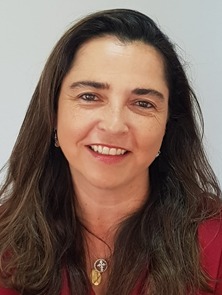
Alejandra Rueda Zarate
PanellistFounder / NES Naturaleza Show CV / Vita
CV / Vita
Ms Alejandra RUEDA ZARATE currently lives in Colombia and has been working with the agricultural industry for over 20 years on the development of new markets and sustainability. She is an economist and holds a Master’s degree in Energy and Resources as well as Peace and Conflict. As a Rotary World Peace Fellow, she has been involved in various initiatives to enhance the living conditions of Latin American farmers. With over 20 years of experience in developing sustainable and market-driven solutions for the agricultural sector, she is the founder of NES Naturaleza, an initiative that has already trained over 4000 smallholder farmers in sustainable development and good agricultural practices. She supported the setting-up of the platform for sustainable trade in various commodities and is a member of the working groups for a wide range of sustainability standards. Her experience also includes assisting the development of the biodiesel market in Colombia and the implementation and certification through sustainability standards along agricultural supply chains.
Close CV / Vita
